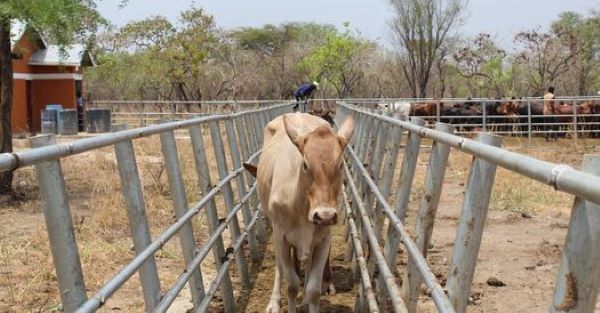Hope at last for livestock farmers in Uganda following a breakthrough by scientists at the National Livestock Resources Institute (NaLIRRI) in developing first of its kind anti-tick vaccine which is now getting ready for sale.
This is an intervention which is poised to save Ugandan’s cattle population of about 14 million cattle from the devastating effects of ticks and tick-borne diseases (TTBDs).
“Research on this vaccine started in 2016 with a view of coming up with a local solution to save farmers from the burden of tick related diseases,” said Dr. Fredrick Kabi, the lead investigator of anti-tick vaccine development and senior research officer at NaLIRRI.
He added that the developed vaccine has no kick down effects as compared to use of acaricides which tend to give quick but not long lasting results.
“The vaccine takes a slow effect because once the animals are injected, the ticks feeding on them become weak with time and die eventually reducing disease burden,” said Kabi.
Tick species targeted
Some of the targeted tick species include Rhipicephalus appendiculatus, R. decoloratus and Amblyomma variegatum affecting most cattle breeds in the country.
Put differently, vaccine will help tackle three tick species: brown ear tick, bont tick, and blue tick, all common in East and Central Africa but also diseases like East Coast Fever, anaplasmosis, and Babesiosis sometimes known as Redwater.
The vaccine has passed tests at the NaLIRRI and five others sites in Mbarara Zonal Agricultural Development Research Institute where Zabu and Long Horn Ankole cattle breeds are reared.
Other sites include Maruzi and Nabwin in Karamoja with Short-horned East African Zebu, Kiruhura with Ankole cattle and Isimba where the tests were done on Boran cattle breed.
NaLIRRI is under the tutelage of the National Agricultural Research Organization (NARO) in Nakyesesa, Wakiso district.
Tick-borne disease menace
It has been observed that the tick-borne diseases (TBDs) are considered the most important animal disease challenge in Africa.
In Uganda, scientists have observed that the favorable equatorial climatic conditions suitable for livestock production also support large tick populations, which enhances the transmission of TBDs.
The new anti-tick vaccine development in Uganda comes at a time when the country is facing ticks’ resistance to acaricides leading to the death of many animals.
Vaccination
Once released farmers are expected to carry out vaccinations consistently for three years to ensure resistance against the tick-borne diseases.
A total of 5000 doses of the vaccine have been developed and will be released to farmers once the registration process is complete.
“Already infactructure for mass production of the vaccine is in place at our institute awaiting official launch and our team is now dealing with the registration process with the National Drug Authority (NDA) before commercial production starts,” said Kabi.
Once released farmers and vet doctors will administer it either through intramuscular injection or by swallowing it orally.
“Over 75% of total cattle losses in Uganda have been attributable to TTBDs and control costs for TTBDs in cattle accounts for 86% of the total animal disease control costs,” observes









